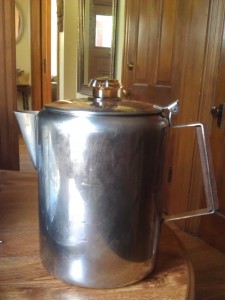Living in a fast-forward world, I frequently find myself questioning my direction.
When our 4th or 5th Mr. Coffee failed, I told Mike it was time to get a Keurig. Everyone else had one, and the company was finally making filters so you could make your own individual cup with coffee that was more economical and with less plastic waste.
“No. Too expensive, too much waste,” came the reply, despite my new filter update.
“Fine,” I said, and then purchased an old-fashioned electric percolator which made ever-so-tasty coffee and complemented my retro inclinations. When the electric base of the second percolator failed, however, I brought up the Keurig idea again. A couple of years had passed, and everyone still raved about the convenience and immediacy of their java delivery systems.
“No,” came the steadfast reply.
So I dug through our camping gear and pulled out the 12-cup metal percolator we purchased from REI ohsomany years ago and haven’t looked back since. No, it doesn’t have an auto-timer. Yes, you have to wait for five minutes once the water boils before getting your fix. But the benefits?
I can clean it in a minute (and to be honest, I’ve never felt comfortable with the idea of what might be growing inside the complicated contraptions many people drink from). Nothing will break. The counter space I now have because the pot stays on the stove is abundant! And b est of all, the coffee is fresh and delicious!
est of all, the coffee is fresh and delicious!
I didn’t stop with reversing our coffee pot trend, however. When our microwave died, I felt positively giddy.
“I’m not replacing it!” I announced to my husband, who knew enough by the tone of my voice that I would not be asking for his opinion.
Although the ability to nuke things had become even more of a perceived necessity than an automatic coffee pot, it didn’t take too long to readjust to cooking and reheating things the way they did before everyone became dependent on the latest technological advances in chow prep. Even if it’s just psychological, the fact that we no longer have a nuclear device in our kitchen has made me feel healthier. And again, the counter space liberated by the absence of that old Battlestar Galactica has opened up more possibilities for fresh food preparation!
While I’m thinking about installing a clothes line this week (I’ll go to the hardware store after I post this), I’ve got to share another retro decision I’m experimenting with, thanks to a suggestion made by my youngest son, and this one feels ever so right. I’m now on day 9 of a no-soap-on-my-face-no-shampoo-in-my-hair routine.
I remember that my grandmother would use “cold cream” on her face–never soap–and when we would snuggle, her cheeks would be velvety soft.
My routine involves massaging a half-and-half mixture of castor oil and olive oil into my skin and then pressing a hot, wet facecloth over my face. My skin already feels softer and cleaner, and if you think about it, it makes perfect sense. How many years have I used chemicals to strip things off my face, only then to add back moisturizing cream? Insanity!
As for the hair, Jake told me that I had to be strong for a full month to realize the benefits of using no shampoo, and it’s been a challenge to use only hot water so far. When I went to the opera the other night, I told myself that people would think nothing of my somewhat plastered-looking “do”; after all, the oils in my hair allowed me to style it as if I were using  mousse and hairspray, and with the dress I was wearing, there weren’t too many people looking at my hair! Although day 5 was probably the most difficult, I feel that my scalp is finally adjusting to the new routine, and neither my husband nor my oldest son have noticed anything unusual!
mousse and hairspray, and with the dress I was wearing, there weren’t too many people looking at my hair! Although day 5 was probably the most difficult, I feel that my scalp is finally adjusting to the new routine, and neither my husband nor my oldest son have noticed anything unusual!
Some will say that I’m being a hippy, and that’s okay. I’ve always chosen my own path, though sometimes I’ve ended up in a place that encourages me to stop and reconsider. I look at the next half of my life and think about how much more I want to learn and experience, and I want to take what I’ve already learned and use those lessons as launching points for further growth.
I want to decide for myself if what we consider to be progress is, in fact, “better,” and in many cases I know that I will need to reevaluate past practices. I believe that sometimes it’s helpful to go in reverse to set yourself back onto a path that will lead you to memorable places.
